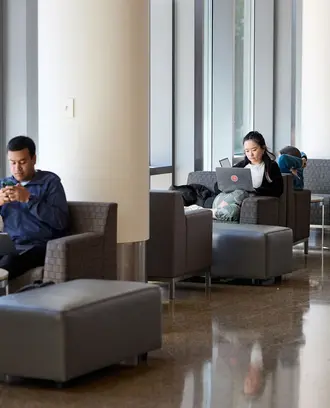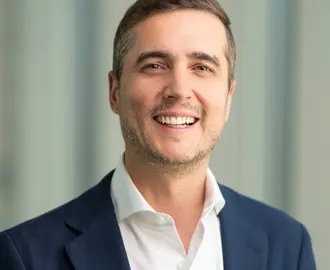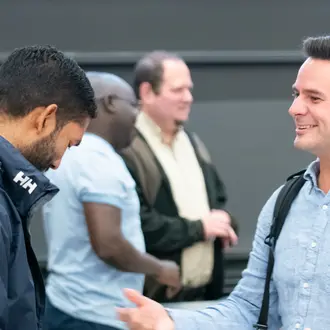Originally from Mexico, Nayelli Garcia Avalos, SFMBA ’22, is a marketing professional with international expertise, notably spending 14 years rising through the ranks at Nestlé. There, she led the transformation of global brands and the delivery of personalized customer experiences in digital platforms for markets in Mexico, Brazil, and Switzerland. Following her time at Nestlé, Nayelli founded Monbaby Latin America in 2018, a successful wearable technology startup.
You were well-established in your career and advancing rapidly. What prompted you to apply to the MIT Sloan Fellows MBA?
Nayelli Garcia Avalos SFMBA '22
During my stint with Nestlé, I collaborated with colleagues who had MBAs and realized they had embraced disruption, reshaped industries, and accelerated their career growth by becoming agile leaders. They also had broader international networks of cross-functional relationships, and I wanted that, too. I decided on the MIT Sloan Fellows MBA because I was looking for in-depth discussions with mid-career peers who had failed and rebounded. I was looking to grasp the competencies and behaviors that allowed them to thrive.
I also wanted to go to the frontier of marketing. People who work in my field dream up great communication campaigns, but today you must leverage data and analytics to personalize customer experiences. To quote the marketing pundit Sir Martin Sorrell, today’s advertising relies less on “Mad Men” and more on “Math Men.” Advertising firms no longer operate Don Draper style. The marketing analytic brains are now in charge, and MIT Sloan rules in that domain.
What was it like to spend a year full-time at MIT?
I spent that year as a sponge soaking up the wisdom, experience, and values of world-class A-players: classmates, faculty, and speakers. They allowed me to live the lessons I was learning. The full-time format was crucial as the social aspect of the program is what makes it valuable. This is what makes it sticky! It allowed me to engage while benchmarking with great teams. And the profound connections I made are lasting.
Talk about those lessons for a moment. Looking back, what did you take away from that year?
For one thing, I discovered the impact of having a solid network of relationships—and of investing enough time in building it. I came to understand the significance of soft skills. By collaborating with classmates from diverse cultures, I observed the different ways in which they resolved conflict and how they prioritized relationships with a future-focused perspective.
I improved my negotiation skills through practice and realized that leadership is about making changes through savvy strategies. My time as an MIT Sloan Fellow also fueled my enthusiasm about advancing in the corporate world, and it accelerated my journey on that path. So yes, it was a year of growth—in every direction.
Did you learn as much as you’d hoped in marketing?
Much more. I entered the program with a certain confidence when it came to marketing subjects given that I have many years of experience in that area, along with having created award-winning communication campaigns. I thought the marketing courses would be my easiest subjects. They were not at all. It was a shock to realize just how much I did not know. MIT is incredibly strong in the marketing realm, and I benefited enormously from that strength.
Professors Ben Shields, Sinan Aral, Dean Eckles, David Gammarnik, and Vivek Farias, for instance, opened my eyes to the metaverse and its technology, sports analytics, synthetic media, growth marketing, subscription strategies, and applied statistical modeling. I always have had an interest in advanced marketing analytics, but I never fully understood the depth of possibilities, of how to leverage AI to understand what audiences are looking for. Brands that do not fully leverage their data and analytics will fail, no matter how consolidated they are. I fully understood this only after learning from innovation teams like those at the MIT-IBM Watson AI Lab.
Your husband came along with you to Cambridge. How was his experience?
Lucas and I have been together for 15 years. While we were dating, I went to work in Brazil and Switzerland, and we had to navigate a long-distance relationship. It was tough. So, when we found out I was admitted to MIT, he was super supportive and decided to come along. Like me, Lucas had never taken a gap year. He decided that this was the perfect time to do that. It turned out to be an incredibly rich year for him. He suddenly had access to the vibrant life of MIT and took full advantage of that.
He was all over the place every day, attending a Blockchain event here and a lecture on logistics there. He even joined the Supply Chain Club.
Fireside chats with world-class speakers on investment banking, marketing, new technologies, the latest trends? He was there. Our time at MIT also gave him a chance to beef up his English skills. He learned more during that one-year sabbatical than he would have in another 15 years of work. And it was culturally eye-opening for us both to spend so much time with the other Fellows and their families. You should see his eyes light up when he talks about the program. In fact, I would not be surprised if he someday decided to apply!



